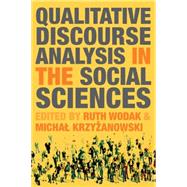
What is included with this book?
| List of Tables | p. viii |
| List of Figures | p. ix |
| List of Contributors | p. x |
| Introduction: Discourse Studies - Important Concepts and Terms | p. 1 |
| Introduction | p. 1 |
| Discourse and text | p. 4 |
| Context | p. 10 |
| Genre | p. 14 |
| Outline of the volume | p. 21 |
| Notes | p. 23 |
| References | p. 24 |
| Analyzing Newspapers, Magazines and Other Print Media | p. 30 |
| Introduction | p. 30 |
| Laying the foundations: what are print media? | p. 30 |
| Why study print media? | p. 32 |
| Production and consumption | p. 32 |
| Getting started and engaging with your data | p. 34 |
| Corpus-building | p. 35 |
| Key resources for textual analysis | p. 38 |
| Checks and balances: comparative evidence from reference corpora | p. 44 |
| Summary | p. 48 |
| Notes | p. 49 |
| Key readings | p. 51 |
| References | p. 51 |
| Analyzing Communication in the New Media | p. 54 |
| Introduction | p. 54 |
| New media: an overview | p. 54 |
| Why investigate communication in the new media as a social scientist? | p. 58 |
| Compiling a corpus of CMC texts | p. 59 |
| What is a genre? | p. 63 |
| Key properties of scholarly email postings | p. 64 |
| Summary | p. 72 |
| Notes | p. 73 |
| Key readings | p. 74 |
| References | p. 74 |
| Analyzing TV Documentaries | p. 77 |
| Introduction | p. 77 |
| Defining documentaries | p. 77 |
| The powerfulness of documentaries | p. 78 |
| Types of documentaries | p. 79 |
| Preconditions for the analysis of documentaries | p. 79 |
| Steps towards a meaningful analysis of television documentaries | p. 80 |
| Analyzing verbal and multimodal aspects of documentaries | p. 84 |
| Levels of analysis and selection of a transcription method | p. 90 |
| Including necessary context information | p. 92 |
| Notes | p. 94 |
| Key readings | p. 94 |
| References | p. 94 |
| Analyzing Political Rhetoric | p. 96 |
| Introduction | p. 96 |
| What is political rhetoric? | p. 96 |
| The politolinguistic approach | p. 97 |
| A selection of analytical categories | p. 99 |
| How to conduct a politolinguistic analysis of political rhetoric - a theoretical outline of the research practice | p. 100 |
| Doing politolinguistic analysis - an example | p. 101 |
| Concluding remarks | p. 117 |
| Notes | p. 118 |
| Key readings | p. 119 |
| References | p. 119 |
| Analyzing Interaction in Broadcast Debates | p. 121 |
| Introduction | p. 121 |
| Steps in analysis | p. 122 |
| Text and contexts | p. 123 |
| Applying the framework to interaction in debates | p. 127 |
| Debates and other genres | p. 140 |
| Notes | p. 142 |
| Key readings | p. 142 |
| References | p. 142 |
| Analyzing Research Interviews | p. 145 |
| Introduction | p. 145 |
| Approaches to discourse analysis in different disciplines | p. 146 |
| Contexts for discourse analysis of research interviews | p. 150 |
| Co-text | p. 152 |
| Intertextual links | p. 153 |
| Context of situation | p. 154 |
| Sociopolitical and historical contexts | p. 157 |
| Issues in analysis and explanation | p. 158 |
| Notes | p. 159 |
| Key readings | p. 159 |
| References | p. 159 |
| Analyzing Focus Group Discussions | p. 162 |
| Focus groups and their foci | p. 162 |
| Exploring key features of focus groups | p. 164 |
| The (process of) framing focus groups | p. 165 |
| Approaching and analyzing focus groups | p. 167 |
| Thematic structures in focus group discourse: example of analysis | p. 169 |
| Conclusions | p. 177 |
| Notes | p. 178 |
| Key readings | p. 179 |
| References | p. 179 |
| Discourse Analysis and Ethnography | p. 182 |
| What is ethnography? | p. 182 |
| Analyzing organizational discourse | p. 183 |
| In the field: gathering and analyzing ethnographic data | p. 186 |
| Interpreting ethnographic data in discourse-oriented research | p. 190 |
| Assessing the quality of research and the principle of reflexivity | p. 196 |
| Notes | p. 198 |
| Key readings | p. 199 |
| References | p. 199 |
| Glossary | p. 204 |
| Index | p. 209 |
| Table of Contents provided by Ingram. All Rights Reserved. |
The New copy of this book will include any supplemental materials advertised. Please check the title of the book to determine if it should include any access cards, study guides, lab manuals, CDs, etc.
The Used, Rental and eBook copies of this book are not guaranteed to include any supplemental materials. Typically, only the book itself is included. This is true even if the title states it includes any access cards, study guides, lab manuals, CDs, etc.